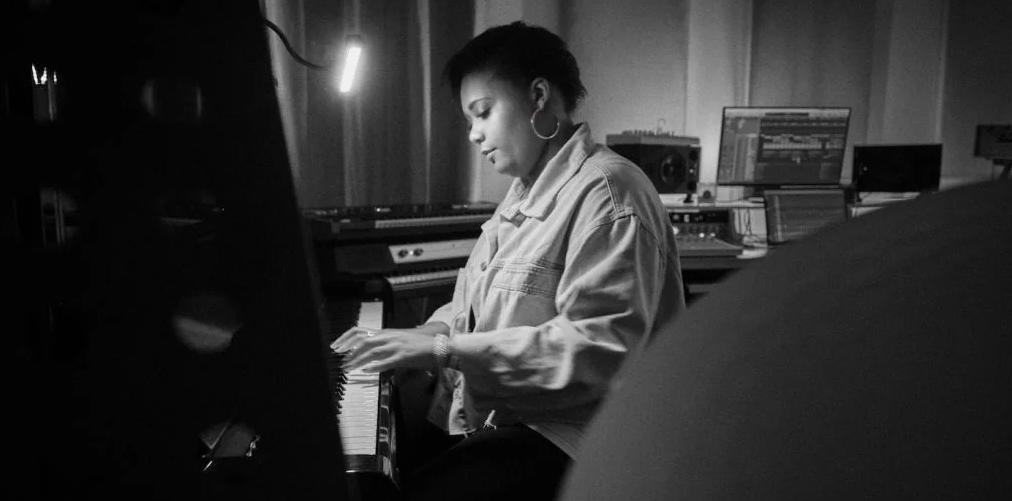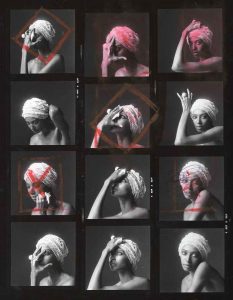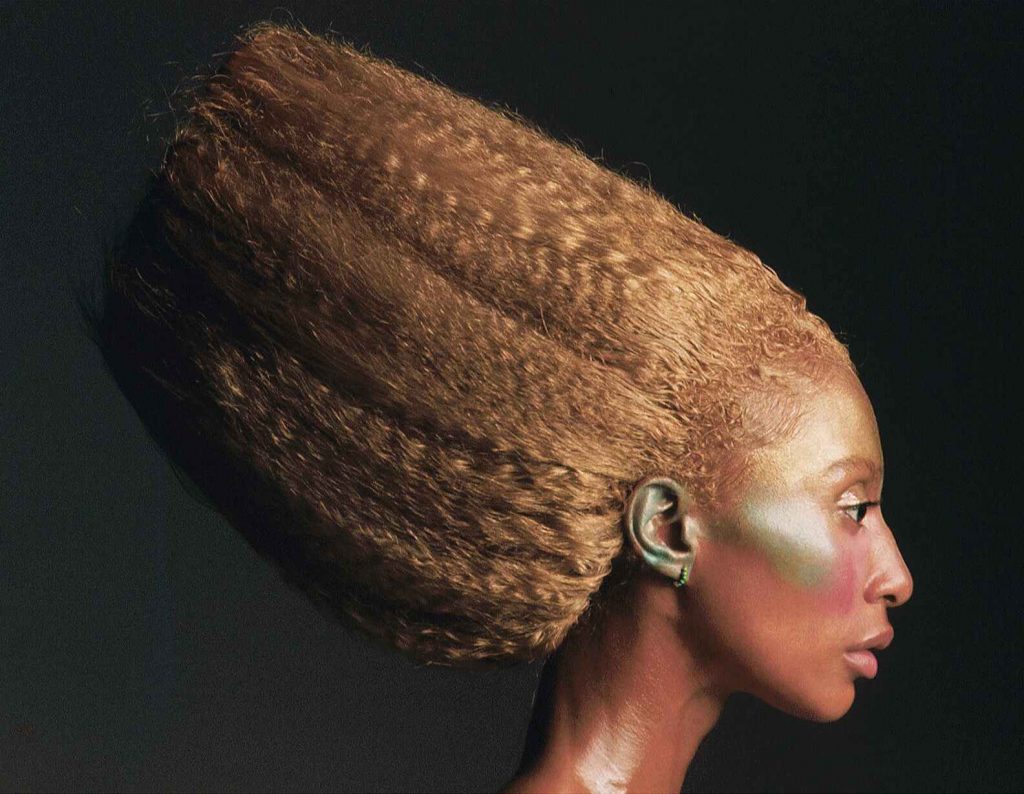
Kelly Mac resume includes far more than her composing credits. Mac, who most recently scored Donyale Luna: Supermodel, is the founder and CEO of Kelly Mac Music, which represents talent in composing, music supervision, songwriting, and licensing. In other words, Mac is helping to pave the way for other artists.
With Donyale Luna: Supermodel, she tells the story of perhaps one of the 20th Century’s most mysterious artists, supermodel Donyale Luna. She was the first Black supermodel who created this persona, this surrealist character who was art. The documentary, which was directed by Nailah Jefferson, is both a revealing yet confounding experience, similar to Luna’s own work.
As for Mac, she previously worked on the BET+ comedy, Block Party, and Essence Magazine docuseries Time of Essence. She took the time to speak with Below the Line about her score for Donyale Luna: Supermodel as well as her ambitions beyond composing.
Below the Line: What are you working on today?
Kelly Mac: Today’s kind of a mixed bag. I’ve been working on some records for some artists and creating a little compilation projects on my own and also doing some team meetings and my business.
BTL: As a composer, is it nice having different gigs to jump from? Maybe if you’re stuck on a piece of music, you can lose yourself in another project and return fresh to thes score?
Mac: I think having a mixed bag of things is great for just that reason. If I’m stuck on the artist side, I can switch over. The composing side, things a little bit more dialed in there that kind of give you some creative direction and throw out some references for you and can get your creative juices flowing that way. And then also I enjoy wearing a business hat and getting the switch between left and right brain throughout the day. And so yeah, the creative juices feel a little drained and I can do some more mental work or business work and then vice-versa. If I want to kind of shut my brain off and just be able to be artistic, then I get to do that too.
BTL: You studied music management, right?
Mac: Yeah, I studied music management at Berklee.
BTL: Not a lot of musicians have backgrounds in business. How’s that helped you on the creative side?
Mac: It’s something that I feel is kind of necessary for an artist today or for a composer producer. You have to be your own business, in a sense, and be an entrepreneur. It is great if you can wear those both hats and you can be an advocate for yourself within the industry and use that as a way to bring in work for yourself.

BTL: I do want to ask more about Berklee College, but going into the documentary, how’d you approach all the chapters in Daniel’s life differently?
Mac: Daniel’s story is pretty unique and she’s very avant-garde, and her story has a lot of arcs, but she also constantly gets knocked back down time and time again. We started the score out pretty sparse, which is like a piano melody. We used a lot of repetitive one note melodies in arpeggios to represent how she’s constantly running and trying to escape her past and her pain.
She starts as this small town girl from Detroit who ends up getting a lot of backlash just for how different she looks, and then she ends up running to modeling and she runs to New York and then gets on the cover of these magazines and then faces backlash again. She’s constantly running from city to city in search of acceptance. And so, the score hopefully paints the picture of that, and she’s basically created this whole persona as this artistic place that she can go and find freedom and find expression and acceptance there.
The story ends up in a dark place towards the end, and we take these themes from the beginning and repurpose them towards the end, but this time with more dissonance. We’ll use the themes, but they’re more broken up this time, or we’ll use layers that are heavier in the score to show the world of or paint the picture of the world falling apart.
BTL: You’re helping to introduce this artist to a lot of people for the first time. Musically, you’re doing a lot to define how people will interpet who she is. How did that weigh on your choices?
Mac: It can be a little bit challenging at times, especially when you’re working with the team. You really want to make sure that you’re telling the story. Ultimately, as the composer, it’s my job to tell the story from the director’s point of view and help bring the director’s vision to life. And with the scene where she rises in New York, that was sort of a challenge. We were trying to get that emotional tone for the audience, and most of the cues were kind of in this dreamy, atmospheric place, and we kind of did that for the New York scene, but that didn’t really feel right when you’re seeing these montages of New York in the sixties.
And so, we had to go back a few times to really get that cue and to make sure that we were telling the story. We ended up using a rhythm section that was inspired by Motown and doing something a little bolder with a little more attitude there, but then also layering in these sweeping strings, kind of encompassing Danielle’s persona. So, we layered that on top to create a cohesive score.
BTL: Did you see many differences between scoring for the person and the persona?
Mac: Well, as the composer, it is my job to help paint this persona of her world kind of rising up when she’s on the cover of these publications like Vogue and Harper’s Bazaar, and in those moments, we tried to capture the power and the grandeur of that by switching from a minor key to a major key.
We did things like putting these repetitive percussive hits and these drum hits that felt celebratory and a fanfare almost. But then we also would switch back when she gets the backlash and gets knocked down to this minor key and goes back to some of those arpeggiated themes and melodies. So yeah, it’s definitely an arc that we had to take that we had to paint the picture of throughout the film.
BTL: Artistically, how’d you find Danielle inspiring?
Mac: It was definitely inspiring, especially to see how she basically gave herself permission to be anyone that she wanted to be. She got into modeling, but then she also moved to acting, and then she moved to Avant-garde films, and she wrote a children’s book with all these cool dreamy illustrations, and she was just this creative director in all these different disciplines and art forms, and that was really creative to see because she pretty much lived outside of the box and didn’t really wait for permission to enter any of those spaces. So as an artist, that’s always really inspiring to see.

BTL: You mentioned the motown influence earlier, so how’d swinging London, ‘60s tunes maybe influence your choices in depicting that time period?
Mac: We definitely were inspired by the whole British invasion, so we allowed ourselves to kind of take a little bit of a departure there and use a full rhythm section the same way that artists from London in the ‘60s would be doing during that time. We used really dissonant guitars and hard hitting drums and tried to capture the whole invigorating feeling of London that at the same time we would use drum samples to give it a modern flair.
BTL: Let’s circle back to Berklee College. How was your experience there? Was that a dream school for a composer?
Mac: I pretty much decided around 16 years old that I wanted to be a producer, and I went in toward a few different schools, but no school seemed to offer everything that Berklee had to offer. So I knew from early on that I wanted to go there, and it was an amazing experience. You’re just surrounded by musicians, and it feels like music is literally what you eat, sleep, and breathe, and it’s the only thing that matters in the world. It’s pretty special and I definitely miss it a lot.
BTL: Do you still approach music like, eating, sleeping, and breathing music?
Mac: I think as you get older you have to balance things out a little bit more. Yeah, I was up until five in the morning working on projects back then, so now I definitely like to have a little bit more work-life balance
BTL: What was your first gig after Berklee in the music business?
Mac: I started out interning at a few different studios in New York, which was a cool experience, but at the same time, didn’t give me enough hands-on experience. I ended up creating my own production team, and I moved in with a bunch of roommates. Some of them were from Berklee, some of them were from the DMV area where I’m from.
BTL: Where’d you go from there?
Mac: So we just started producing a bunch of emerging artists in New York and all along the east coast. We were doing everything from their albums to live shows to music videos, and it was a really fun and creative time, but at the same time, I wasn’t really making a living consistently from music and working a bunch of part-time jobs.
I ended up sending a resume out to a bunch of music companies in Manhattan and was trying to get a front desk job with the hopes that I would move up the ladder and start composing. And then, one company got my resume and heard my music and they were like, “We don’t need anyone at the front desk. Why don’t you write on our score?” And that first score that I wrote ended up landing and being a big national commercial. So that was kind of the first official gig after college.
BTL: When did composing feel more steady as a gig?
Mac: I think it probably took about five or six years of constant pounding the pavement and trying to get work as a composer. About five or six years in, I got to the point where so much work was coming in that I couldn’t do it all myself. At that point I was able to build out my team in a very organic way, and I was also able to start picking and choosing the projects that I wanted to work on, which is a great place to be for any artist.
BTL: What do you hope to just achieve over the next few years with your music and the company?
Mac: I would say that we hope to become a top tier company that’s working with major studios and working on major films and TV projects and brands, and our goal is to pair up with storytellers who want to bring compelling stories to the forefront and bring them to life. We want to contribute artistic, contemporary music to the world.
Donyale Luna: Supermodel is now available to stream on Max.





